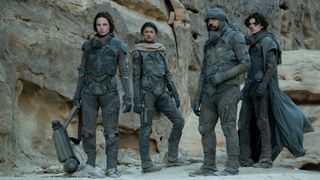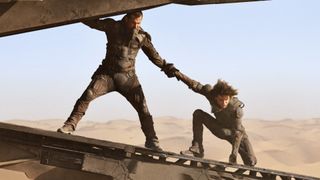Dune production designer and cinematographer on bringing Denis Villeneuve's vision to life
12DOVE talks to Dune's head of production design and director of photography

Dune is a sci-fi tale of epic proportions. The latest adaptation of Frank Herbert's novel only covers half of the book's plot, but the scope of the story is huge – we visit multiple planets in the distant future, following the fight for control of Arrakis, the only source of 'spice', the most powerful substance in the universe.
"As absorbing as Dune’s plot is, it’s the world-building that will leave your mind blown," reads sister publication Total Film's review. "The costumes, the production design, and the visual effects are all elite-level, perfectly harnessed to bring Villeneuve’s vision of Herbert thrillingly alive."
12DOVE sat down with the movie's head of production design, Patrice Vermette, and director of photography, Greig Fraser to talk about sci-fi, collaborating with Denis Villeneuve, and avoiding comparisons to Star Wars. These interviews have been edited for clarity and length.
Could you describe, in your own words, what your role on Dune entailed?
Patrice Vermette: My role on Dune was to create, and to support, Denis' vision of the book. He read the book when he was 13, 14 years old, and he made storyboards with a friend of his when he was 15 years old. So for him, it's a book that is very important, and with that comes a responsibility of creating a world that will support Denis' vision. So basically, production design is about creating the environments in which the story will unfold. And it's also finding the locations and creating the style, the environments, the atmospheric style.
Greig Fraser: As the director of photography, I am responsible for translating a director's vision, the way he wants to see the world, the way he wants to feel the world, into a malleable visual point… I do that in consultation, obviously, with everybody else, the director, the production designer, the VFX supervisor, but ultimately, it's the director and the script that I relate to because if the director wants to tell a story a certain way, and have a certain feeling, then there are a lot of tools that I can use to make those things happen, be it lenses, be it format, be it the brightness, be it the lighting. So I basically play and pull the strings of all the technical things at my disposal, to be able to relay the vision and the story the way the director wants to.
What was your collaborative process with director Denis Villeneuve like?
Sign up for the Total Film Newsletter
Bringing all the latest movie news, features, and reviews to your inbox
PV: Denis and I have known each other since the ‘90s, we did commercials together, we're long-time friends, and so we have a shorthand. We come from a similar family background, with our parents or education. And so we have similar tastes in music and similar tastes in art and in sci-fi, and in movies, and I like to think of my collaboration with him as a support. I'm the bass player of his band.
GF: Denis is a fantastic visual director, but he's also very concentrated on actors. He is, I wouldn't say perfect, because it implies that other directors who I work with are not perfect, but he is a version of a perfect series of skills, where he concentrates on the actors when he needs to concentrate on the actors and the story. But he also understands that if the camera is not telling the right story, then there's no point in the actors telling the right story, because the audience will be like, 'Oh, what was that. Like, I don't understand that visually.'... It's really up to me to be conscious of the audience's subconscious.

Did you look to any previous screen adaptations of Dune for inspiration, or maybe even things that you wanted to avoid in your version?
PV: With all due respect to David Lynch, we all saw it. We knew we did not want to go there. And it was not a remake. I saw [Alejandro] Jodorowsky's Dune – I love Mobius' work, but it was not part of the inspiration. And the thing we really wanted to stay away from was Star Wars because George Lucas was so influenced by Frank Herbert's book that we knew people would compare it because of this – Tatooine, the sand, the Bene Gesserit, the Voice is the Force. The brief was to dream, to be as original as we could but also to anchor things. A dream, but a dream that is in reality. Like the sand worms, the ornithopters, all of those elements that are part of Frank Herbert's universe needed to be grounded.
GF: Denis made it very clear from the beginning that this was an adaptation from the book.
Did you feel that you needed to follow the book's descriptions? What's it like balancing a script when you've also got source material like a book?
PV: What I found is that the book gives a lot of clues or cues that will help you navigate it to design things, but it's quite nonspecific… Arrakis, it's the planet of sand, where there's no moisture, there's no humidity, there's winds that go at 880 kilometers an hour, there's sandworms, there's heat, so with those cues you're like, 'Okay, if I was going to create a city or a settlement there, what would I do? I know that the Fremens live in caves, they live in temples built within the rock formation. But if I was another world entity coming in, a colonial empire coming in, I would probably take into consideration a couple of things. The sandworms. So I would not build the city in open desert, that would be way too dangerous, because just building things would create vibration that would attract the worm, and it would be just a total disaster.
So you say, okay, probably the city would be built in a rock bowl, a mountain bowl, to have a proper grounding. Then you probably want to say well, because of the wind, I would probably want to build everything at an angle so the wind sweeps over the buildings and it doesn't fight against the wind. And then those buildings, you'd probably want to build things extremely thick. So it preserves the interior, it keeps a coolness inside. And you don't want to have any direct light because the heat and the light kills. So you probably have a system of light wells.' So you go with the description that you find in the book.
Dune has a lot of VFX and CGI – does working on a movie like that differ from a movie that doesn't have those things? Does that impact your creative process?
GF: There are certain key things you have to do differently. Like, you have to be aware that you can't just go and do whatever you want because the VFX supervisor may not have the tools that he needs to repair it later, or to extend it later… In every film that I've done, there's always an element of VFX or something, even in a film that you don't think there's any VFX in, I guarantee there is some, there has to be, not has to be, of course, but there is. So a DoP has to be very mindful of that aspect of things, because it doesn't matter how good we've done our job. If we don't allow the special effects supervisor to do their job properly, it's gonna look not great.
Do you approach different genres – like sci-fi with Dune – in different ways?
GF: I don't approach it from a genre perspective. I don't go through the toll gate of the genre, I go through the toll gate of the director's vision for the genre. So you could have easily been a musical, but if Denis' vision had been the same, I would have approached it the same. So, in fact, sometimes when you go off-brand, when you go, 'Well, this is what a sci-fi looks like.' But you actually do it differently, that's when it can look really exciting. So I don't even know what sci-fi looks like anymore. Like, you know, [2001: A Space Odyssey] and Tarkovsky's sci-fi and George Lucas', I don't even know what sci-fi looks like anymore, because we're so broad and so varied. So the path that we took with this was as natural a look as we possibly could.
Dune is available on digital download now and 4K UHD, Blu-Ray, DVD, and VOD on January 31.
I’m an Entertainment Writer here at 12DOVE, covering everything film and TV-related across the Total Film and SFX sections. I help bring you all the latest news and also the occasional feature too. I’ve previously written for publications like HuffPost and i-D after getting my NCTJ Diploma in Multimedia Journalism.
